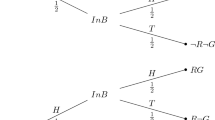Abstract
Recently in epistemology a number of authors have mounted Bayesian objections to dogmatism. These objections depend on a Bayesian principle of evidential confirmation: Evidence E confirms hypothesis H just in case Pr(H|E) > Pr(H). I argue using Keynes’ and Knight’s distinction between risk and uncertainty that the Bayesian principle fails to accommodate the intuitive notion of having no reason to believe. Consider as an example an unfamiliar card game: at first, since you’re unfamiliar with the game, you assign credences based on the indifference principle. Later you learn how the game works and discover that the odds dictate you assign the very same credences. Examples like this show that if you initially have noreason to believe H, then intuitively E can give you reason to believe H even though Pr(H|E) ≤ Pr(H). I show that without the principle, the objections to dogmatism fail.
Similar content being viewed by others
References
Alston W. (1989) Epistemic justification. Cornell University Press., Ithaca, NY
Audi R. (1993) The structure of justification. Cambridge University Press., Cambridge
Burge T. (2003) Perceptual entitlement. Philosophy and Phenomenological Research 67: 503–548
Castell P. (1998) A consistent restriction of the principle of indifference. British Journal of Philosophy of Science 49: 387–395
Chisholm R. (1989) Theory of knowledge 3rd edn. Prentice Hall, Englewood Cliffs, NJ
Davies M. (2003) The problem of armchair knowledge. In: Nuccetelli S. (eds) New essays on semantic externalism and self-knowledge. MIT Press, Cambridge, pp 23–56
Harsanyi J. (1976) Essays on ethics, social behavior, and scientific explanation. Reidel, Dordrecht
Keynes, J. M. (1997). The general theory of employment, interest, and money. Amherst, NY: Prometheus Books. (Original work published 1936.)
Knight F. (1921) Risk, uncertainty and profit. Houghton Mifflin, Boston
Kotzen, M. (2008). Dragging and confirming. Unpublished manuscript. University of North Carolina—Chapel Hill. Retrieved November 28, 2008, from http://matthewkotzen.net/Matthew%20Kotzen_files/Draggingfinal.pdf.
McKinsey M. (2003) Transmission of warrant and closure of apriority. In: Nuccetelli S. (eds) New essays on semantic externalism and self-knowledge. MIT Press, Cambridge, pp 97–116
Moore G.E. (1939) Proof of an external world. Proceedings of the British Academy, 25: 273–300
Peacocke C. (2004) The realm of reason. Oxford University Press, Oxford
Pryor J. (2000) The skeptic and the dogmatist. Noûs 34: 517–549
Pryor J. (2004) What’s wrong with Moore’s argument?. Philosophical Issues 14: 349–378
Pryor, J. (2008). Uncertainty and undermining. Unpublished manuscript. New York University. Retrieved March 26, 2008, from http://www.jimpryor.net/research/papers/Uncertainty.pdf.
Schiffer S. (2004) Skepticism and the vagaries of justified belief. Philosophical Studies 131: 525–557
Strevens M. (1998) Inferring probabilities from symmetries. Noûs 32(2): 231–246
Talbott, W. (2008). Bayesian epistemology. In E. Zalta (Ed.), The Stanford encyclopedia of philosophy, Fall 2008 edition. http://plato.stanford.edu/archives/fall2008/entries/epistemology-bayesian/.
Van Fraassen B. (1989) Laws and symmetry. Oxford University Press, Oxford
Vogel J. (1990) Cartesian skepticism and inference to the best explanation. Journal of Philosophy 87(11): 658–666
Vogel J. (2008) Internalist responses to skepticism. In: Greco J. (eds) The Oxford handbook of skepticism. Oxford University Press, Oxford
Weatherson B. (2005) Should we respond to evil with indifference?. Philosophy and Phenomenological Research 70(3): 613–635
Weatherson B. (2007) The Bayesian and the dogmatist. Proceedings of the Aristotelian Society 107(1): 169–185
White R. (2006) Problems for dogmatism. Philosophical Studies 131(3): 525–557
Wright C. (2002) (Anti-)sceptics simple and subtle: G.E. Moore and John McDowell. Philosophy and Phenomenological Research 65(2): 330–348
Wright C. (2007) The perils of dogmatism. In: Nuccetelli S., Seay G. (eds) Themes from G.E. Moore: New essays in epistemology and ethics. Oxford University Press, Oxford
Author information
Authors and Affiliations
Corresponding author
Rights and permissions
About this article
Cite this article
Kung, P. On having no reason: dogmatism and Bayesian confirmation. Synthese 177, 1–17 (2010). https://doi.org/10.1007/s11229-009-9578-9
Received:
Accepted:
Published:
Issue Date:
DOI: https://doi.org/10.1007/s11229-009-9578-9




